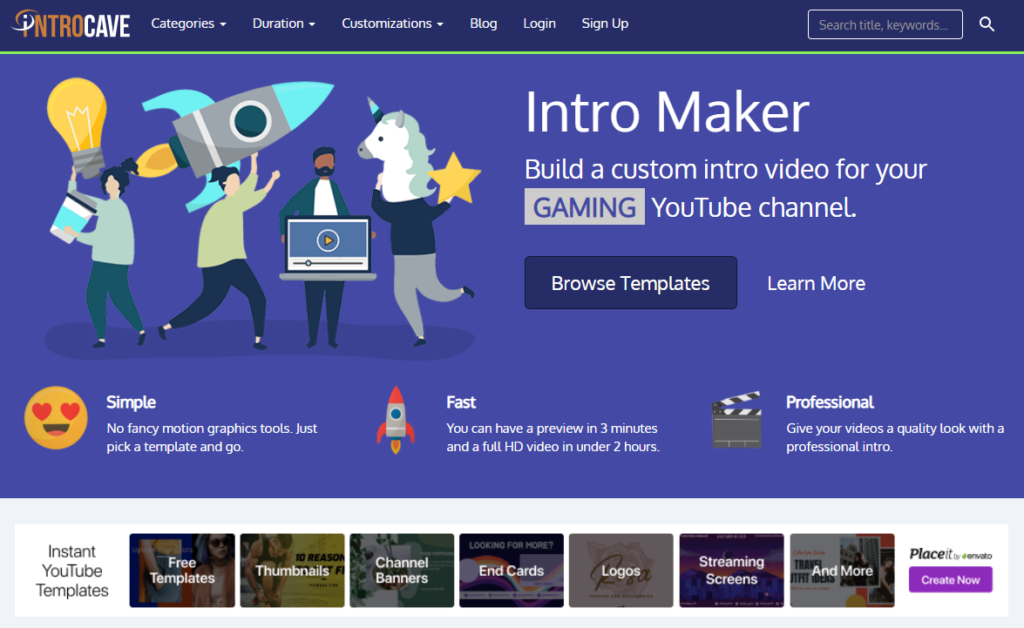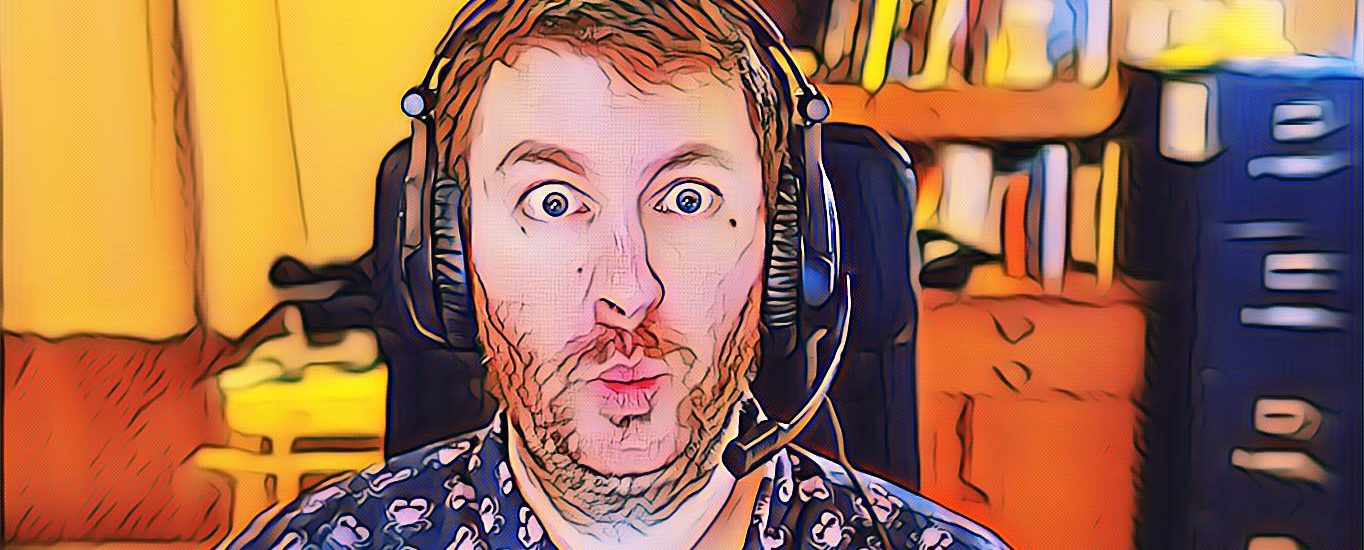When you think about watching a movie or a TV show, the production company usually has a little logo animation that plays in front of the opening credits. That trend has carried over into the YouTube world, and those quick little logo reveals are called intro videos. IntroCave primarily sells gaming intro videos, but they have been branching out into other categories of intro videos. Will Hankinson is the brains behind IntroCave and here is my interview with him.

How did you come up with your product idea? Was there another person or a situation in your life that made you want to create it?
I didn’t! I was working full time at a game studio at the time, and I wanted to keep my web development skills sharp. I started shopping around for a business in the $50-$200k range that I could acquire instead of starting something from scratch. My plan while shopping for a business was to get a ruby-based SaaS product. IntroCave is neither (one-time digital ecommerce and built with Laravel), but I’m bullish on YouTube and knew I would enjoy working on animation tools.
How is your product different or unique?
Most online video makers (there are LOTS) are focused on small businesses, video editing, and collaboration. Intro videos are a small niche within that broader market, but it’s one where subscriptions don’t make sense for a lot of content creators. If you’re a small agency, a subscription plan for video tools makes a lot of sense! If you’re just starting out on YouTube, you don’t really need more than one intro video. With IntroCave, I’m tightly focused on the individual content creator. For now, that means pay-per-video instead of subscription and a focus on clip creation instead of collaboration or editing. I’ll likely add subscription plans in the next year, but with gaming intro videos especially I don’t want to stop offering one-time purchases.
Is this your first entrepreneurial venture?
Nope! I came out of grad school in 2007 and started working at web startups. I would make Flash games at night and ended up doing pretty well with those (Filler made close to $50k). I’ve released maybe a dozen Flash and iPhone games over the years, but none have really been smash hits. I’ve built and discarded a ton of small websites as well, but only a handful had entrepreneurial aspirations (none that took off). As an employee, I ran a couple of large-scale Facebook games back when that was a thing, and through those I developed quite a taste for optimization and A/B testing.
Was there anything in your past (childhood, young adulthood) that made you a better entrepreneur? Tell me a bit about your past as you see relevant (where are you from, where did you go to school?)
Video games might be something from my past that shaped my entrepreneurial ventures today. I grew up in a fairly rural part of Georgia and didn’t really think about what I wanted to do for a job until I was a few years into undergrad. I was studying film and took a few 3D animation classes, which I LOVED. I was much better at writing scripts and building tools than the actual art side of things, though, so I decided to go to grad school to learn how to make video games. I didn’t have a particular passion for web development at the time, but the Digital Media program at Georgia Tech taught me enough PHP and MySQL to land a junior web development job in Silicon Valley after I graduated.
I had the maker bug by that point, and Silicon Valley is a great place to soak that stuff up. I was reading a lot of Hacker News and TechCrunch, participating in hackathons with friends, and building Flash games on the side. I had friends that started companies, but I never really had an idea that I felt strongly enough about to quit a high-paying engineering job. I was happy making engineer wages by day and working on side projects at night, and I guess I’ve stuck to that pattern ever since.
Tell me a bit about you. (Hobbies, favorite entertainment, favorite vacation spots)
I love video games. I generally make smaller puzzle games, but I play mostly AAA stuff like first person shooters. My roommates and I had competitive Madden leagues in undergrad and we drove around the Southeast to compete in Halo tournaments. I was a film studies major before switching to games in grad school, and I continue to love cinema.
We travel quite a bit. My wife’s family is from Taiwan, and we try to do a big 6-week trip over there every few years. I’ve been to a ton of national parks out West (that was my main motivation for moving to Silicon Valley, I just figured I’d need to learn how to write code to finance that). We moved back to Atlanta a few years ago to be closer to my family, but as our boys get bigger I’m playing around with the idea of getting a camper van and just taking summers off to bum around national parks with them. My extended family loves the beach, so we do that a fair bit.
I used to go whitewater kayaking (and can still do an Eskimo roll in a pinch), but now I mostly stick to lakes with a sit-on-top kayak or paddleboard. My side of the family (and my kids) LOVE fishing, so we do that a lot. I just like being on the water, so I’m happy to paddle my older son around in my tandem and let him do all the fishing.
When did you decide to become an entrepreneur? What were the circumstances in your life at the time?
My first job out of college was… fine. I’m grateful they took a chance on me and I learned a ton but working on my own stuff was so much more fulfilling than working on someone else’s passion. Less than a year out of school, I didn’t see any way that I could be an employee for 40 or 50 years. That first job didn’t pay tremendously well by today’s standards, but it was still more money than I knew what to do with. I stumbled across personal finance blogs when I was figuring out what to do with my extra Flash game money, and that set me on the path to FIRE early. My wife’s family is more into real estate, so we also do rental properties. Real estate is fast paced compared to index funds, but I wanted something that I could directly affect even more strongly. Some people say monetizing your hobbies is a sure-fire way to make you hate them, but I enjoy the business aspect of things.
Tell me a bit about your company or team (do you have any other people working with in team or you are working all by yourself?)
Solo indie for now! I’m not against hiring people, but the business would probably need to replace my full-time income and then some before it would make sense to expand.
Did you invest any money in your business? Were there others that funded it?
I financed IntroCave on a line of credit. All the profits currently go towards paying down that debt, so I haven’t actually made any money yet (if we’re talking value, the “equity” value has certainly increased, though). I talked to a couple of incubators and looked at some of the new bootstrapper-focused financing options, but they weren’t a great fit. They mostly focus on SaaS (which I’m not), don’t fund acquisitions, and generally pay ~$100k so you can go full time for a year. I might take another look once I build out subscriptions and get the original debt paid down, but we’ve done pretty well at our W-2 jobs and real estate. It feels crazy to say, but $100k doesn’t really move the needle enough to ditch my current job. I could move a lot faster by working on the business 5 days a week, but I don’t know that I’d move 5 times faster. I’d probably need more like $250k (about 2 years of runway) to have enough confidence to go full time on it, but there’s not a ton of people lining up to invest $250k in a business that’s $50-100k in debt and might have a ceiling of $100-200k annual revenue.
What helps you to stay on your path and follow your goal during the tough time?
Having $125k of debt is a pretty good motivator, but I just like building and tinkering. I don’t need much motivation to build stuff.
What were the best decisions you made when you were starting your business?
It’s too early to say whether this was a good decision or not, but I feel like it was a good decision. Early on in the due diligence for IntroCave, I saw that the vast majority of traffic was coming from searches related to the phrase “intro maker.” The domain https://intromaker.com was parked and not doing anything, so I reached out and started negotiating. It took a few months to come to terms, but in the end, I paid a stupid amount of money for what I think is a pretty great domain. IntroCave’s high water mark is somewhere around $5-6k revenue, but I’ve only ever been able to rank around the 5-7 spots for “intro maker.” My plan is to build a new product under the Intro Maker brand, and I’m confident that, if I can rank highly for that, the ceiling is going to be much higher than it is for IntroCave.
What were the worst decisions you made when you were starting your business?
It would be easy to say that I overpaid (a big chunk of that on an earnout from improvements I made in the first year), but given a long enough time horizon $20-40k is not going to make that huge of a difference. If I’m able to recoup what I put into the business and then own a steady income-producing asset for years to come, the price was probably worth it.
What advice have you found indispensable in running your business?
I listen to a ton of bootstrapper podcasts and read a lot of Hacker News. I’d say the one piece of content that sticks out was an article from a few years ago about the processing of buying a business (https://blog.codetree.com/articles/what-its-like-buying-a-128k-side-project.html). Before reading that article, I thought of acquisitions as either acquihires or the multi-million-dollar acquisitions that make big splashes in the tech press. I always had a bit of cash coming in from side projects, but I hadn’t really thought of them as assets that you could buy and sell before reading that article.
Going forward, what are your plans for this product or for other entrepreneurial pursuits?
I’m currently rebuilding the backend render engine for IntroCave. I’m doing 2,000-3,000 renders a day right now (most of them free previews), and at that volume it takes a bit more babysitting than I’d like. If I can squeeze out a little more stability (and make it easier to deploy new content), that will free up some bandwidth to work on the next big thing. Once the new tech is in place it should be a bit easier to scale up and down based on render volume, and that’s when I plan to start adding subscription plans.
The next big thing after that is Intro Maker, which is currently planned as a downloadable tool with 30 or so customizable templates. While everyone else targets small businesses and agencies, I really like the idea of focusing down on the solo creator / prosumer market. I believe that the market of people who are willing to pay a few hundred dollars for decent microphones/lights/cameras are also willing to shell out $50-$100 for digital tools that help them produce content faster. Even if that idea fails spectacularly, I can always build that tool into my current render pipeline as a way to get more interesting video templates for IntroCave.
IntroCave and Intro Maker (and my day job) will probably keep me busy for the next couple of years. Once IntroCave is debt free, I’ll think a bit harder about what comes next. Do I acquire something else, optimize that, and grow it? I like the idea of acquiring 3-4 small software businesses that throw off enough cash to piece together a good income (private equity light?).
What advice do you have for entrepreneurs who are just starting their journey?
If you’re not having much luck starting something from scratch, consider acquiring something that already has some traction.
Why do you stick with your day job when IntroCave is making $50k/year?
My current job is at a marketing agency, which means I build a lot of MVPs, internal tools, and marketing pages for clients. I’m good at that stuff and create a lot of value there, but it’s not as fun for me as product work, optimization, and growth. Earlier in my career I probably would’ve flamed out by now and taken another run at going indie full time… but IntroCave recharges those batteries pretty nicely. I’ve talked to a few product companies and startups in the last couple of years, but those types of jobs wouldn’t leave much room for side hustles and family.
I’ve taken a few shots at the “make-do-with-less” lifestyle in the past. I’ve taken half-time-half-salary roles at a couple of jobs over the years to focus on my web/game ideas. I took about a year off when my first son was born to freelance and work on indie games. In those previous attempts, I was always trying to start something from scratch and never got very far (other than wearing out my wife’s patience).
I could survive on $50k/year if IntroCave never grows beyond that, but I can also make 6 figures as an engineer and invest nearly all of that income WHILE making $50k/year on IntroCave. If we continue at our current pace, my wife and I can both call it quits in 5-10 years and I can work on whatever I want to work on at that point. I guess earlier in my career, the finish line seemed so far away that I was willing to gamble more (though, arguably, dropping 6 figures on a potentially unstable internet business is arguably my biggest gamble ever).
Will is an interesting and innovative entrepreneur with a lot of wisdom to bring to anyone newer in the game. I highly recommend following him on social to watch as he grows and evolves his current offerings.





